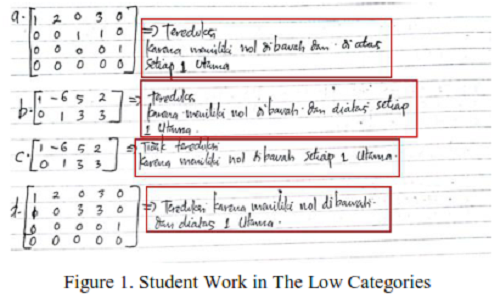
Student’s Algebraic Thinking Ability in Solving Mathematical Problems Based Misconceptions
Abstract
Keywords
Full Text:
PDFReferences
Badawi, A., Rochmad, R., & Agoestanto, A. (2016). Analisis Kemampuan Berpikir Aljabar dalam Matematika pada Siswa SMP Kelas VIII. Unnes Journal of Mathematics Education, 5(3), 182-189.
Barbosa, A., Vale, I., Jablonski, S., & Ludwig, M. (2022). Walking through Algebraic Thinking with Theme-Based (Mobile) Math Trails. Education Sciences, 12(5), 346.
Dwirahayu, G., Kustiawati, D., & Yanti, R. A. (2018). Analisis Kemampuan Berpikir Aljabar Berdasarkan Miskonsepsi. Prosiding Seminar Nasional Pendidikan Matematika dan Matematika Universitas Muhammadiyah Tangerang.
Farida, I., & Hakim, D. L. (2021). Kemampuan Berpikir Aljabar Siswa SMP pada Materi Sistem Persamaan Linear Dua Variabel (SPLDV). JPMI (Jurnal Pembelajaran Matematika Inovatif), 4(5), 1123-1136.
Herstein, I. N. 1964. Topics in Algebra (2 ed). The United States of America, USA: Xerox Corporation.
Kieran, C. (2004). Algebraic Thinking in the Early Grades: What Is It. The Mathematics Educator, 8(1), 139-151.
Meilani, P. P., Rohaeti, T., & Rahmatudin, J. (2022). Profil Kemampuan Berpikir Aljabar Siswa Smp Pada Materi Luas Permukaan Kubus. Integral: Pendidikan Matematika, 13 (1), 26-39
National Council of Teachers of Mathematics. (2000). Principles and Standards for School Mathematics. The United States of America, USA: Library of Congress Cataloguing.
Nurtasari, A. R., Jamiah, Y., & Suratman, D. (2017). Miskonsepsi Siswa Pada Materi Himpunan Di Kelas VII SMP Santa Monika Kubu Raya. Jurnal Pendidikan dan Pembelajaran Khatulistiwa (JPPK), 6(2), 1-10.
Riskon, M., Rochmad, R., & Dewi, N. R. (2019). Kemampuan Berpikir Aljabar Siswa Menggunakan Model Creative Problem Solving. In Prosiding Seminar Nasional Pascasarjana (PROSNAMPAS) (Vol. 2, No. 1, pp. 353-356)
Saputro, G. B., & Mampouw, H. L. (2018). Profil Kemampuan Berpikir Aljabar Siswa SMP Pada Materi Persamaan Linear Satu Variabel Ditinjau Dari Perbedaan Gender. Numeracy, 5(1), 77-90.
Sukmawati, A. (2015). Berpikir Aljabar dalam Menyelesaikan Masalah Matematika. Math Didactic: Jurnal Pendidikan Matematika, 1(2), 89-95.
DOI: http://dx.doi.org/10.31258/jes.7.3.p.465-473
Refbacks
- There are currently no refbacks.
Copyright (c) 2023 Anggriati Ledu Ngaba

This work is licensed under a Creative Commons Attribution 4.0 International License.
Publisher: FKIP Universitas Riau












